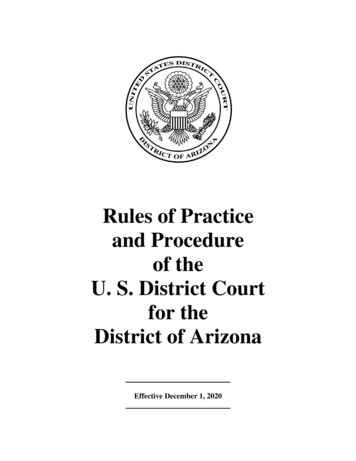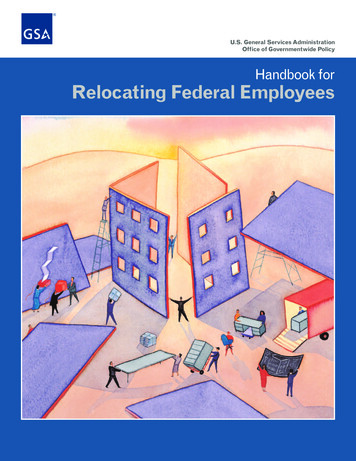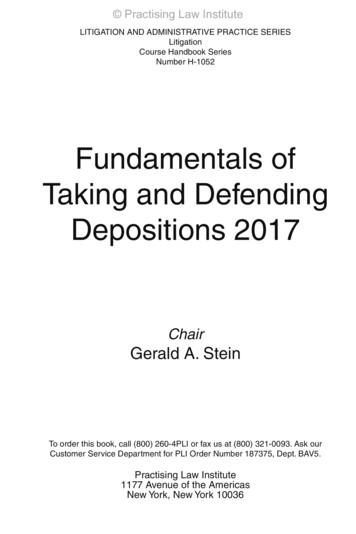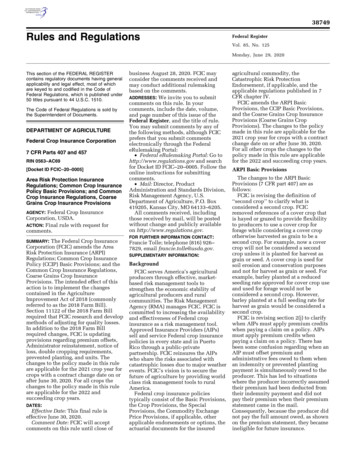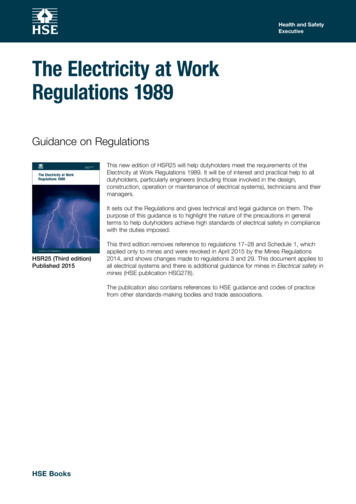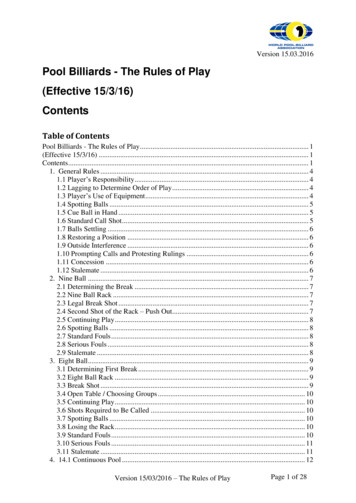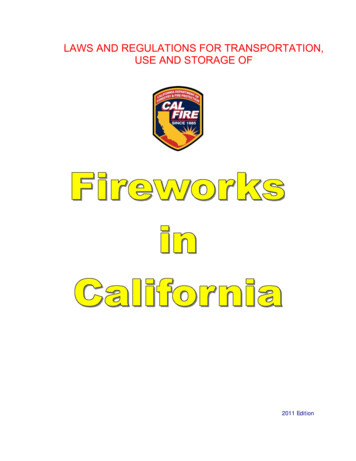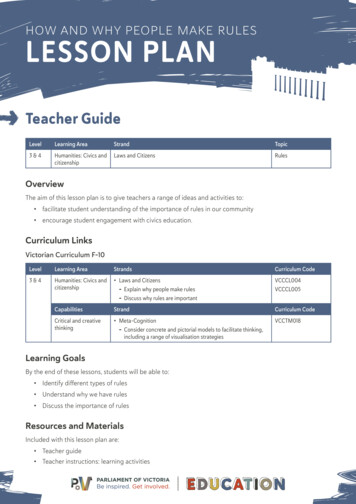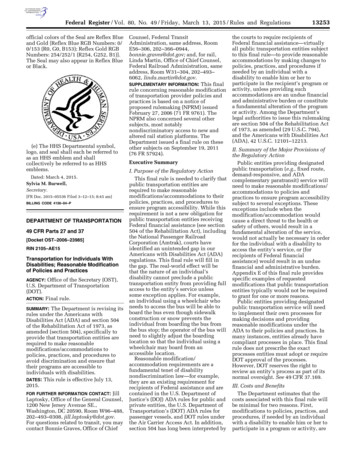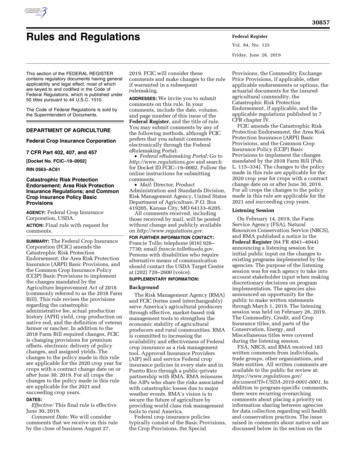
Transcription
30857Rules and RegulationsFederal RegisterVol. 84, No. 125Friday, June 28, 2019This section of the FEDERAL REGISTERcontains regulatory documents having generalapplicability and legal effect, most of whichare keyed to and codified in the Code ofFederal Regulations, which is published under50 titles pursuant to 44 U.S.C. 1510.The Code of Federal Regulations is sold bythe Superintendent of Documents.DEPARTMENT OF AGRICULTUREFederal Crop Insurance Corporation7 CFR Part 402, 407, and 457[Docket No. FCIC–19–0002]RIN 0563–AC61Catastrophic Risk ProtectionEndorsement; Area Risk ProtectionInsurance Regulations; and CommonCrop Insurance Policy BasicProvisionsFederal Crop InsuranceCorporation, USDA.ACTION: Final rule with request forcomments.AGENCY:The Federal Crop InsuranceCorporation (FCIC) amends theCatastrophic Risk ProtectionEndorsement, the Area Risk ProtectionInsurance (ARPI) Basic Provisions, andthe Common Crop Insurance Policy(CCIP) Basic Provisions to implementthe changes mandated by theAgriculture Improvement Act of 2018(commonly referred to as the 2018 FarmBill). This rule revises the provisionsregarding the catastrophicadministrative fee, actual productionhistory (APH) yield, crop production onnative sod, and the definition of veteranfarmer or rancher. In addition to the2018 Farm Bill required changes, FCICis changing provisions for premiumoffsets, electronic delivery of policychanges, and assigned yields. Thechanges to the policy made in this ruleare applicable for the 2020 crop year forcrops with a contract change date on orafter June 30, 2019. For all crops thechanges to the policy made in this ruleare applicable for the 2021 andsucceeding crop years.DATES:Effective: This final rule is effectiveJune 30, 2019.Comment Date: We will considercomments that we receive on this ruleby the close of business August 27,khammond on DSKBBV9HB2PROD with RULESSUMMARY:VerDate Sep 11 201416:17 Jun 27, 2019Jkt 2470012019. FCIC will consider thesecomments and make changes to the ruleif warranted in a subsequentrulemaking.ADDRESSES: We invite you to submitcomments on this rule. In yourcomments, include the date, volume,and page number of this issue of theFederal Register, and the title of rule.You may submit comments by any ofthe following methods, although FCICprefers that you submit commentselectronically through the FederaleRulemaking Portal: Federal eRulemaking Portal: Go tohttp://www.regulations.gov and searchfor Docket ID FCIC–19–0002. Follow theonline instructions for submittingcomments. Mail: Director, ProductAdministration and Standards Division,Risk Management Agency, United StatesDepartment of Agriculture, P.O. Box419205, Kansas City, MO 64133–6205.All comments received, includingthose received by mail, will be postedwithout change and publicly availableon http://www.regulations.gov.FOR FURTHER INFORMATION CONTACT:Francie Tolle; telephone (816) 926–7730; email francie.tolle@usda.gov.Persons with disabilities who requirealternative means of communicationshould contact the USDA Target Centerat (202) 720–2600 (voice).SUPPLEMENTARY INFORMATION:BackgroundThe Risk Management Agency (RMA)and FCIC (terms used interchangeably)serve America’s agricultural producersthrough effective, market-based riskmanagement tools to strengthen theeconomic stability of agriculturalproducers and rural communities. RMAis committed to increasing theavailability and effectiveness of Federalcrop insurance as a risk managementtool. Approved Insurance Providers(AIP) sell and service Federal cropinsurance policies in every state and inPuerto Rico through a public-privatepartnership with RMA. RMA reinsuresthe AIPs who share the risks associatedwith catastrophic losses due to majorweather events. RMA’s vision is tosecure the future of agriculture byproviding world class risk managementtools to rural America.Federal crop insurance policiestypically consist of the Basic Provisions,the Crop Provisions, the SpecialPO 00000Frm 00001Fmt 4700Sfmt 4700Provisions, the Commodity ExchangePrice Provisions, if applicable, otherapplicable endorsements or options, theactuarial documents for the insuredagricultural commodity, theCatastrophic Risk ProtectionEndorsement, if applicable, and theapplicable regulations published in 7CFR chapter IV.FCIC amends the Catastrophic RiskProtection Endorsement, the Area RiskProtection Insurance (ARPI) BasicProvisions, and the Common CropInsurance Policy (CCIP) BasicProvisions to implement the changesmandated by the 2018 Farm Bill (Pub.L. 115–334). The changes to the policymade in this rule are applicable for the2020 crop year for crops with a contractchange date on or after June 30, 2019.For all crops the changes to the policymade in this rule are applicable for the2021 and succeeding crop years.Listening SessionOn February 14, 2019, the FarmService Agency (FSA), NaturalResources Conservation Service (NRCS),and RMA published a notice in theFederal Register (84 FR 4041–4044)announcing a listening session forinitial public input on the changes toexisting programs implemented by theagencies. The purpose of the listeningsession was for each agency to take intoaccount stakeholder input when makingdiscretionary decisions on programimplementation. The agencies alsoannounced an opportunity for thepublic to make written statementsthrough March 1, 2019. The listeningsession was held on February 26, 2019.The Commodity, Credit, and CropInsurance titles, and parts of theConservation, Energy, andMiscellaneous titles were coveredduring the listening session.FSA, NRCS, and RMA received 183written comments from individuals,trade groups, other organizations, andState entities. All written comments areavailable to the public for review at:https://www.regulations.gov/document?D USDA-2019-0001-0001. Inaddition to program-specific comments,there were recurring overarchingcomments about placing a priority oninformation sharing between agenciesfor data collection regarding soil healthand conservation practices. The issueraised in comments about native sod arediscussed below in the section on theE:\FR\FM\28JNR1.SGM28JNR1
30858Federal Register / Vol. 84, No. 125 / Friday, June 28, 2019 / Rules and Regulationsnative sod changes. Comments includedsuggestions for the commercialization ofindustrial hemp, further research ofindustrial hemp, and the need toimplement the 2018 Farm Bill quicklyfor the industrial hemp industry tothrive.Statements regarding RMA issuesoutside the scope of this rule that arenot addressed include those aboutWhole Farm Revenue Protection, yielddata for Agriculture Risk Coverage(ARC) and Price Loss Coverage (PLC)programs, Dairy Margin Coverage andLivestock Gross Margin-Dairy programs,specialty crop insurance, and the USDAinteragency workgroup for cover crops.While not related to this rule, thecomments will be considered by RMAwhen implementing 2018 Farm Billsections that do not require regulatorychanges.In general, RMA related listeningsession comments focused on the timingof when the 2018 Farm Billrequirements would go into effect. RMAwas urged to issue rules andinformation as quickly as possible.khammond on DSKBBV9HB2PROD with RULESMandatory Farm Bill ProvisionsProvisions in the 2018 Farm Bill thatrequire revisions in the FCIC regulationsare discussed below.Administrative Fee ChangesSection 11110 of the 2018 Farm Billincreased the Catastrophic RiskProtection Endorsement AdministrativeFee from 300 to 655. The FederalCrop Insurance Act mandates that FCICoffer a catastrophic risk protection planto indemnify producers for crop lossdue to loss of yield or preventedplanting when the producer is unable toplant other crops for harvest on theacreage for the crop year due to drought,flood, or other natural disaster.Catastrophic risk protection offers aproducer coverage for a 50 percent lossin yield, on an individual yield or areayield basis, indemnified at 55 percent ofthe expected market price. FCIC willpay a premium subsidy equal to thepremium established for the coverageprovided under this endorsement.However, producers will pay anadministrative fee of 655 for each cropin the county unless otherwise specifiedin the Special Provisions. Theadministrative fee will be updated inthe regulation in 7 CFR 402.4, in section6(b).APH Cup OptionSection 11112 of the 2018 Farm Billadded the regulatory authority toprovide producers with an election tolimit the decrease in APH to not morethan 10 percent of the prior crop year’sVerDate Sep 11 201416:17 Jun 27, 2019Jkt 247001APH (cup), provided that theproduction decline was the result ofdrought, flood, natural disaster, or otherinsurable loss; and that FCIC establishactuarially sound premiums to cover theadditional risk. The cup option wasimplemented procedurally in FCIC—18010 Crop Insurance Handbook onDecember 2017 for 2018 crops with aContract Change Date of November 30,2017, or later.FCIC is adding the cup option in 7CFR 457.8 section 36(c) in the CCIPBasic Provisions.Crop Production on Native SodSection 11114 of the 2018 Farm Billrevised the crop production on nativesod provisions related to cropinsurance. Most provisions (such as thepenalties, de minimis acreage,applicable States) for native sod fromthe Agricultural Act of 2014 (Pub. L.113–79, 2014 Farm Bill) remain thesame. The 2014 Farm Bill provisionswere in effect for native sod acreagetilled from February 8, 2014, untilDecember 20, 2018, which was theduration of the 2014 Farm Bill. Fornative sod acreage tilled after the dateof enactment of the 2018 Farm Bill, thenative sod reduction in benefits willapply to any insurable crop instead ofonly to annual crops. The reductionswill apply for 4 cumulative crop yearson the acreage when a crop is insured,with a limitation of the first 10 yearsafter initial tillage of the acreage. Thismeans that if the acreage has not met the4 cumulative crop years of an insuredcrop on the acreage within 10 crop yearsafter initially tilling the native sodacreage, after the 10th crop year theacreage is no longer subject to the nativesod reduction in benefits.FCIC is revising the definition of‘‘tilled’’ in the regulation in 7 CFR 407.9in section 1 and in 7 CFR 457.8 insection 1 to remove the reference to‘‘annual crops’’ as the native sodprovisions are now applicable to anyinsurable crop rather than just annualcrops. FCIC is revising 7 CFR 407.9section 5(d) and adding a new section5(f) and 7 CFR 457.8 section 9(e) andadding a new section 9(g) to specify thesection applies to native sod acreagethat has been tilled and planted duringthe timeframe of the 2014 Farm Billuntil that native sod acreage has reached4 crop years of planting. The changesalso specify the section applies to nativesod acreage that has been tilled andplanted to an insured crop during 4cumulative crop years within the first10 crop years after initial tillage onnative sod acreage beginning afterDecember 20, 2018 (the date ofenactment of the 2018 Farm Bill).PO 00000Frm 00002Fmt 4700Sfmt 4700Veteran Farmers or RanchersSection 12306 of the 2018 Farm Billadded a definition of ‘‘veteran farmersor ranchers’’ to the Federal CropInsurance Act and provided for veteranfarmers or ranchers to receive the samebenefits as beginning farmers orranchers. The definition of ‘‘veteranfarmers or ranchers’’ is being added inthe regulation in 7 CFR 407.9 in section1 and in 7 CFR 457.8 in section 1. Thebenefits for a veteran farmer or rancherinclude: Waiving all CAT and additionalcoverage policy’s administrative fees asadded in the regulation in 7 CFR 402.4section 6(c), 7 CFR 407.9 section7(a)(6)(i), and 7 CFR 457.8 section7(e)(4)(i); Providing additional premiumsubsidy 10 percentage points greaterthan the premium subsidy identified inthe actuarial documents as added in theregulation in 7 CFR 407.9 section 7(h)and 7 CFR 457.8 section 7(g); Allowing use of another person’sproduction history of the specificacreage transferred to the veteran farmeror rancher where the veteran farmer orrancher was previously involved in thedecision making or physical activities ofa farm or ranch operation insured underCCIP Basic Provisions policies,specifically, FCIC is revising 7 CFR457.8 section 3(l) to add thatnotwithstanding any other provision insection 3, if the insured is a veteranfarmer or rancher who was previouslyinvolved in a farming or ranchingoperation, including involvement in thedecision-making or physicalinvolvement in the production of thecrop or livestock on the farm, for anyacreage obtained by the veteran farmeror rancher, the veteran farmer or rancherwill receive a yield that is the higher of:Æ The actual production history ofthe previous producer of the crop orlivestock on the acreage in which theveteran farmer or rancher was involved;orÆ The applicable transitional yield(T-yield) of the veteran farmer orrancher; and Increasing, from 60 to 80 percent ofthe applicable T-yield, in thesubstituted yield for yield adjustmentwhen replacing a low actual yield dueto an insured cause of loss under CCIPBasic Provisions policies as specified in7 CFR 457.8 section 36(a)(2).Additional ChangesIn addition to changes statutorilymandated by the 2018 Farm Billmentioned above, FCIC is makingdiscretionary changes to the ARPI BasicProvisions and CCIP Basic Provisions.These changes are described below.E:\FR\FM\28JNR1.SGM28JNR1
khammond on DSKBBV9HB2PROD with RULESFederal Register / Vol. 84, No. 125 / Friday, June 28, 2019 / Rules and RegulationsThe changes to the policy made inthis rule are applicable for the 2020 cropyear for crops with a contract changedate on or after June 30, 2019. For allcrops the changes to the policy made inthis rule are applicable for the 2021 andsucceeding crop years.The additional changes to the ARPIBasic Provisions (7 CFR part 407) andthe CCIP Basic Provisions (7 CFR part457) are as follows:FCIC is revising 7 CFR 407.9 section2(j) of the ARPI Basic Provisions and 7CFR 457.8 section 2(e) of the CCIP BasicProvisions to clarify the provision isonly applicable to another crop policywith unbilled administrative fees andpremium and that loss credits must firstbe applied to the policy and crop withthe associated claim.FCIC published a final rule onNovember 24, 2017, (82 FR 55723–55734) that revised section 2(j) of theARPI Basic Provisions and section 2(e)of the CCIP Basic Provisions to clarifythat with the policyholder’s consent thepremium and administrative fees can beoffset from any prevented planting orindemnity due the policyholder even ifthe offset occurs before the fees arebilled. That allowed insuranceproviders the latitude to contact thepolicyholder and inquire as to whetherthe policyholder would agree to havethe ‘‘unbilled’’ administrative fees andpremium offset from the remainingamount of the loss. In response to the2017 final rule, FCIC received inputfrom the industry.Industry input: Comments FCICreceived suggested the rule reversed thelongstanding position of allowing prebilling date claim offsets withoutconsent for the same crop. AIPs statedthe industry has consistently taken theview that a policyholder’s consent is notrequired in order to perform a claimoffset prior to the billing date for thesame crop. Additionally, AIPs raisedconcerns that if consent is required forthe same (or any) crop to offsetpremium, the insured could push tohave the claim paid prior to the billingdate and file for bankruptcy after theclaim is paid, which could prevent AIPsfrom collecting the premium for thesame crop on which it had just paid outa claim.Response: The provision as currentlywritten could have unintendedconsequences that could negativelyimpact producers if we interpret thisprovision as consent is required for thesame (or any) crop to offset premium.This is because the producers have anexpectation that their premium will beautomatically offset from indemnitiesfor the same crop and may notanticipate paying premium when it isVerDate Sep 11 201416:17 Jun 27, 2019Jkt 247001due. If premium is not received timely,producers are placed on the IneligibleTracking System, which is an electronicsystem to identify persons who areineligible to participate in any programas specified in 7 CFR part 400, subpartU.Therefore, FCIC is revising theprovisions as only applicable to anothercrop policy with unbilledadministrative fees or premium and thatloss credits must first be applied to thepolicy or crop with the associated claim.The specific changes to the CommonCrop Insurance Regulations, BasicProvisions (7 CFR part 457) are asfollows:FCIC is revising the provisions insections 3(f) and (g) regarding assignedyields. The industry has expressedconcern regarding assigned yieldsapplying to all units of the crop policy.The assigned yield is a policy-levelpenalty that occurs when an insured’ssupporting production records do notmatch their production certificationeven when the error only applies to one,or an isolated number of actualproduction history databases.Currently, an assigned yield reducesan insured’s annual yields for the entirecrop year, for all units on the policy, toan assigned yield when any annualyield certified by the insured isincorrect. The assigned yield will notexceed 75 percent of the insured’s prioryear’s approved yield. FCIC is revisingthe language to limit the assigned yieldpenalty to only those basic unit(s)effected by the incorrect certification.FCIC is revising section 3(g)(2) toallow an insured to correct, withoutpenalty, inadvertent errors whencertifying production. Inadvertent errorsinclude clear numerical transpositionsand similar errors made by an insuredwhen certifying their productionreports. There are existing regulatoryexceptions for inadvertent errors madeby an insured for the application, aswell as, exceptions for errors made byUSDA or AIPs for production reporting.This change also allows an exception forinadvertent producer errors that occurwhen a producer certifies theirproduction reports.FCIC is adding a new section 4(d) andrevising section 33 to allow that whenchanges are made to the policyprovisions, AIPs will send the changeselectronically to the policyholder ratherthan as a hard copy. Currently apolicyholder may individually elect toreceive these documents electronically.FCIC is revising the provisions to stateall policy provisions, notices, andcommunications required to be sent bythe AIP to the policyholder will beprovided by electronic means, unlessPO 00000Frm 00003Fmt 4700Sfmt 470030859the AIP does not have the ability totransmit such information to thepolicyholder by electronic means or thepolicyholder elects to receive a papercopy of such information. Therefore,FCIC is adding a new section 4(d) tospecify that not later than 30 days priorto the cancellation date for the insuredcrop that the policyholder will beprovided, in accordance with section33, a copy of the changes to the BasicProvisions, Crop Provisions, CommodityExchange Price Provisions, if applicable,and Special Provisions. In addition,FCIC is adding a new section 4(e) tospecify that acceptance of the changeswill be conclusively presumed in theabsence of notice from the policyholderto change or cancel insurance coverage.FCIC will also make changesaccordingly to the notices required insection 33. These changes will reducethe burden of excess distribution ofpaper policy materials while stillallowing policyholders the option toelect to receive a paper copy.FCIC is removing the provisions insection 5 regarding exclusion of yieldsand moving the provisions to section 36of the revised CCIP Basic Provisions.Because of the various changes tosection 36, FCIC is changing the sectionheading to ‘‘Changes to Yields’’ as thissection will now contain provisionsregarding substitution of yields,exclusion of yields, and yield cups.FCIC is moving the provisions regardingexclusion of yields that were previouslycontained in section 5 to section 36(b).Effective Date and Notice and CommentIn general, the AdministrativeProcedure Act (APA, 5 U.S.C. 553)requires that a notice of proposedrulemaking be published in the FederalRegister for interested persons to begiven an opportunity to participate inthe rulemaking through submission ofwritten data, views, or arguments withor without opportunity for oralpresentation and requires a 30-day delayin the effective date of rules, exceptwhen the rule involves a matter relatingto public property, loans, grants,benefits, or contracts. This rule involvesmatters relating to contracts andtherefore the requirements in section553 do not apply.The Small Business RegulatoryEnforcement Fairness Act of 1996(SBREFA) normally requires that anagency delay the effective date of amajor rule for 60 days from the date ofpublication to allow for Congressionalreview. This rule is not a major ruleunder SBREFA (Pub. L. 104–121).Therefore, RMA is not required to delaythe effective date for 60 days from theE:\FR\FM\28JNR1.SGM28JNR1
30860Federal Register / Vol. 84, No. 125 / Friday, June 28, 2019 / Rules and Regulationsdate of publication to allow forCongressional review.This final rule is effective June 30,2019. Although not required by APA,RMA has chosen to request commentson this rule.Executive Orders 12866, 13563, 13771and 13777Executive Order 12866, ‘‘RegulatoryPlanning and Review,’’ and ExecutiveOrder 13563, ‘‘Improving Regulationand Regulatory Review,’’ direct agenciesto assess all costs and benefits ofavailable regulatory alternatives and, ifregulation is necessary, to selectregulatory approaches that maximizenet benefits (including potentialeconomic, environmental, public healthand safety effects, distributive impacts,and equity). Executive Order 13563emphasized the importance ofquantifying both costs and benefits, ofreducing costs, of harmonizing rules,and of promoting flexibility. ExecutiveOrder 13777, ‘‘Enforcing the RegulatoryReform Agenda,’’ established a federalpolicy to alleviate unnecessaryregulatory burdens on the Americanpeople.The Office of Management and Budget(OMB) designated this rule as notsignificant under Executive Order12866, ‘‘Regulatory Planning andReview,’’ and therefore, OMB has notreviewed this rule.Executive Order 13771, ‘‘ReducingRegulation and Controlling RegulatoryCosts,’’ requires that in order to managethe private costs required to complywith Federal regulations that for everynew significant or economicallysignificant regulation issued, the newcosts must be offset by the eliminationof at least two prior regulations. As thisrule is designated as not significant, itis not subject to Executive Order 13771.khammond on DSKBBV9HB2PROD with RULESClarity of the RegulationExecutive Order 12866, assupplemented by Executive Order13563, requires each agency to write allrules in plain language. In addition toyour substantive comments on this rule,we invite your comments on how tomake the rule easier to understand. Forexample: Are the requirements in the ruleclearly stated? Are the scope and intentof the rule clear? Does the rule contain technicallanguage or jargon that is not clear? Is the material logically organized? Would changing the grouping ororder of sections or adding headingsmake the rule easier to understand? Could we improve clarity by addingtables, lists, or diagrams?VerDate Sep 11 201416:17 Jun 27, 2019Jkt 247001 Would more, but shorter, sectionsbe better? Are there specific sectionsthat are too long or confusing? What else could we do to make therule easier to understand?Regulatory Flexibility ActThe Regulatory Flexibility Act (5U.S.C. 601–612), as amended bySBREFA, generally requires an agencyto prepare a regulatory analysis of anyrule whenever an agency is required byAPA or any other law to publish aproposed rule, unless the agencycertifies that the rule will not have asignificant economic impact on asubstantial number of small entities.This rule is not subject to the RegulatoryFlexibility Act because as noted above,this rule is exempt from APA and noother law requires that a proposed rulebe published for this rulemakinginitiative.Environmental ReviewIn general, the environmental impactsof rules are to be considered in amanner consistent with the provisionsof the National Environmental PolicyAct (NEPA, 42 U.S.C. 4321–4347) andthe regulations of the Council onEnvironmental Quality (40 CFR parts1500–1508). FCIC conducts programsand activities that have been determinedto have no individual or cumulativeeffect on the human environment. Asspecified in 7 CFR 1b.4, FCIC iscategorically excluded from thepreparation of an EnvironmentalAnalysis or Environmental ImpactStatement unless the FCIC Manager(agency head) determines that an actionmay have a significant environmentaleffect. The FCIC Manager hasdetermined this rule will not have asignificant environmental effect.Therefore, FCIC will not prepare anenvironmental assessment orenvironmental impact statement for thisaction and this rule serves asdocumentation of the programmaticenvironmental compliance decision.Executive Order 12372Executive Order 12372,‘‘Intergovernmental Review of FederalPrograms,’’ requires consultation withState and local officials that would bedirectly affected by proposed Federalfinancial assistance. The objectives ofthe Executive Order are to foster anintergovernmental partnership and astrengthened Federalism, by relying onState and local processes for State andlocal government coordination andreview of proposed Federal financialassistance and direct Federaldevelopment. For reasons specified inthe final rule related notice regarding 7PO 00000Frm 00004Fmt 4700Sfmt 4700CFR part 3015, subpart V (48 FR 29115,June 24, 1983), the programs andactivities in this rule are excluded fromthe scope of Executive Order 12372.Executive Order 12988This rule has been reviewed underExecutive Order 12988, ‘‘Civil JusticeReform.’’ This rule will not preemptState or local laws, regulations, orpolicies unless they represent anirreconcilable conflict with this rule.Before any judicial actions may bebrought regarding the provisions of thisrule, the administrative appealprovisions of 7 CFR part 11 are to beexhausted.Executive Order 13132This rule has been reviewed underExecutive Order 13132, ‘‘Federalism.’’The policies contained in this rule donot have any substantial direct effect onStates, on the relationship between theFederal government and the States, oron the distribution of power andresponsibilities among the variouslevels of government, except as requiredby law. Nor does this rule imposesubstantial direct compliance costs onState and local governments. Therefore,consultation with the States is notrequired.Executive Order 13175This rule has been reviewed inaccordance with the requirements ofExecutive Order 13175, ‘‘Consultationand Coordination with Indian TribalGovernments.’’ Executive Order 13175requires Federal agencies to consult andcoordinate with Tribes on agovernment-to-government basis onpolicies that have Tribal implications,including regulations, legislativecomments or proposed legislation, andother policy statements or actions thathave substantial direct effects on one ormore Indian Tribes, on the relationshipbetween the Federal Government andIndian Tribes or on the distribution ofpower and responsibilities between theFederal Government and Indian Tribes.FCIC has assessed the impact of thisrule on Indian Tribes and determinedthat this rule does not, to ourknowledge, have Tribal implicationsthat require Tribal consultation underE.O. 13175. The regulation changes donot have Tribal implications thatpreempt Tribal law and are not expectedhave a substantial direct effect on one ormore Indian Tribes. If a Tribe requestsconsultation, FCIC will work with theUSDA Office of Tribal Relations toensure meaningful consultation isprovided where changes and additionsidentified in this rule are not expresslymandated by the 2018 Farm Bill.E:\FR\FM\28JNR1.SGM28JNR1
Federal Register / Vol. 84, No. 125 / Friday, June 28, 2019 / Rules and RegulationsUnfunded Mandates7 CFR Part 4571. DefinitionsTitle II of the Unfunded MandatesReform Act of 1995 (UMRA, Pub. L.104–4) requires Federal agencies toassess the effects of their regulatoryactions of State, local, and Tribalgovernments or the private sector.Agencies generally must prepare awritten statement, including costbenefits analysis, for proposed and finalrules with Federal mandates that mayresult in expenditures of 100 million ormore in any 1 year for State, local orTribal governments, in the aggregate, orto the private sector. UMRA generallyrequires agencies to consideralternatives and adopt the more costeffective or least burdensome alternativethat achieves the objectives of the rule.This rule contains no Federal mandates,as defined in Title II of UMRA, for State,local, and Tribal governments or theprivate sector. Therefore, this rule is notsubject to the requirements of sections202 and 205 of UMRA.Acreage allotments, Crop insurance,Reporting and recordkeepingrequirements.*Federal Assistance ProgramThe title and number of the FederalDomestic Assistance Program listed inthe Catalog of Federal DomesticAssistance to which this rule applies isNo. 10.450—Crop Insurance.E-Government Act ComplianceFCIC is committed to complying withthe E-Government Act, to promote theuse of the internet and otherinformation technologies to provideincreased opportunities for citizenaccess to Government information andservices, and for other purposes.khammond on DSKBBV9HB2PROD with RULESAdministrative practice andprocedure, Claims, Crop insurance,Disaster assistance, Fraud, Penalties,Reporting and recordkeepingrequirements.7 CFR Part 407Acreage allotments, Administrativepractice and procedure, Barley, Corn,Cotton, Crop insurance, Peanuts,Reporting and recordkeepingrequirements, Sorghum, Soybeans,Wheat.VerDate Sep 11 201416:17 Jun 27, 2019Jkt 247001PART 402—CATASTROPHIC RISKPROTECTION ENDORSEMENT1. The authority citation for 7 CFRpart 402 is revised to read as follows: Authority: 7 U.S.C. 1506(l) and 1506(o).2. Amend § 402.4, section 6 asfollows: A. In paragraph (b)(1), remove ‘‘ 300’’and
Protection Insurance (ARPI) Basic Provisions, and the Common Crop Insurance Policy (CCIP) Basic Provisions to implement the changes mandated by the 2018 Farm Bill (Pub. L. 115-334). The changes to the policy made in this rule are applicable for the 2020 crop year for crops with a contract change date on or after June 30, 2019.
